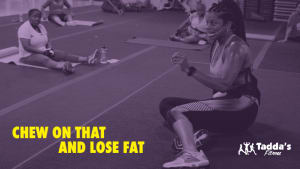
August 14, 2020 “Chew on That and Lose Fat”
When I teach classes on nutrition I always ask, “Where does digestion start?”, the most popular answer is in the stomach. Digestion starts with your senses, sight & smell. Just think, when you walk into a movie theater and smell popcorn, you didn’t actually want it until you smelled it, then you start to salivate, and digestive enzymes are released in your mouth ready to begin breaking down the popcorn, you haven’t even placed in your mouth. The problem is, once you finally place a handful in your mouth, you take a couple of chews and then swallow, followed by another handful of popcorn. Sound familiar? This habit causes you to eat more, digest less, and gain weight. It’s time to break this bad habit and chew on that.
When you chew your food, it gets broken down into smaller pieces that are easier to digest. When mixed with saliva, chewing allows your body to extract the greatest possible amount of nutrients from the food you eat. One common piece of advice is to chew your food an estimated 32 times before swallowing. It takes fewer chews to break down soft and water-filled food. The goal of chewing is to break down your food, so it loses texture. Foods that are harder to chew, such as steak and nuts, may require up to 40 chews per mouthful. Foods like watermelon may require fewer chews to break down, as few as 10 to 15.
I challenge you the next few times you eat, to count how many times you chew your food. Also, observe your loved one while having dinner, see how many times they chew, and let that spark the conversation of appropriate chewing.
Benefits of chewing food slowly
The faster you eat, the more food you tend to eat. Chewing your food many times at a slower pace can reduce your overall food intake. Chewing more during mealtime was found to reduce snacking on candies later in the day.
Besides weight control, chewing your food properly can also help increase the number of nutrients you get out of your food. For example, it has been found that chewing almonds between 25 and 40 times not only suppressed hunger but also increased a person’s ability to absorb nutrients from the almonds.
If you have digestive problems, drinking water when you eat is not always good for you. Drinking water can slow the digestive process by diluting enzymes in the body that break down food. This effect is especially intense if you suffer from digestive disorders such as gastroesophageal reflux disease. FYI: The colder the water the harder for food to break down.
Not chewing food enough
When you do not chew your food enough, the rest of your digestive system becomes confused. Your body may not produce enough of the enzymes needed to fully break down your food. This could lead to digestive problems, including:
- Choking, aspiration, bloating, diarrhea, heartburn, acid reflux, cramps, nausea, headaches, skin problems, irritability, malnutrition, indigestion, gas
Get the most out of your food by eating right. Here are helpful hints for how to eat to improve your digestive health:
- Drink 30 minutes before or after you eat, but not with your meal. This increases the efficiency of your digestion.
- Do not drink coffee right after a meal. That can speed up your digestion and send you to the bathroom. It can also cause heartburn from its acidity.
- Avoid fruits and processed sweets right after a meal. Sugary foods are digested quickly and may cause gas and bloating.
- Avoid exercising strenuously after a meal. Digestion requires energy, and it’s less efficient when you’re exercising.
- Eat more fermented foods like sauerkraut and pickles. They contain digestive enzymes and beneficial bacteria needed to help your body absorb essential nutrients. Eating these foods can reduce symptoms of irritable bowel syndrome, gluten intolerance, allergies, and asthma.
- Eat raw or slightly steamed vegetables, which contain higher amounts of enzymes and fiber. These are important for good digestion.
- Go for a walk after a meal. This speeds the rate at which food moves through your stomach, aiding digestion.
- Use a good probiotic. Poor sleeping and eating habits and travel can throw your digestion out of whack. Taking probiotics, made up of healthy bacteria, can help set your digestive system right again. Talk to a doctor to see which probiotics are best for your body. You can purchase these at Tadda’s Fitness.
Proper digestion starts in with your senses, but what happens in your mouth, is the most important step before it reaches your stomach. So, when eating, be sure to chew your food thoroughly to get the full benefits and nutrients. By focusing on chewing many times, you will eat slower. This can improve your digestion, help you eat less, and enhance your overall eating experience. No Mess



